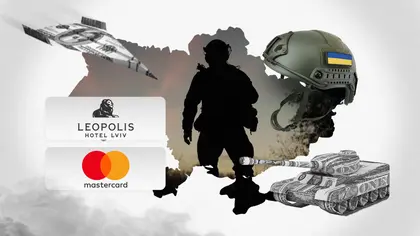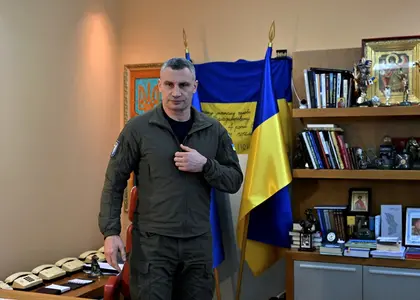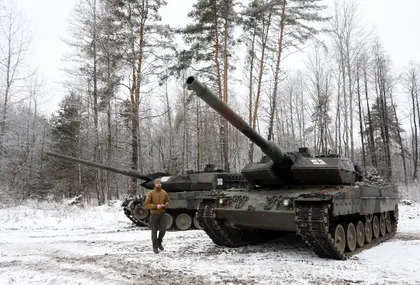Ukraine’s economy has been buffeted for the past eight years. First came the Russian occupation of Crimea, followed by the war in the Donbas. Then came the pandemic. Today it is struggling to push back a full-scale invasion. Nevertheless, Ukraine is still an attractive country for foreign investors.
JOIN US ON TELEGRAM
Follow our coverage of the war on the @Kyivpost_official.
"Now potential investors see how Ukraine and Ukrainians survive and cope with a situation where hundreds of missiles fly at cities and infrastructure almost every day, and this is impressive,” Victor Hartwall told Kyiv Post. Hartwall, from Finland, is the owner of the Leopolis Hotel, which has been hosting guests in Ukraine for 15 years.
“Therefore, it is clear that when the war ends and the situation stabilizes, investors will come, realizing how people work here and with what energy, strength, etc.," Hartwall said.
Niclas Diesen, the CEO of K.Hartwall Invest, which provides services in the area of long-term industrial investments and liquid assets, said that some investors in the infrastructure industries have already set aside certain budgets in order to invest in Ukraine.
According to Diesen, the turbulence of the past eight years – counterintuitively – helps keep long-term investments, because "you are waiting for the right time when you can get out of the investment and this helps you, as an investor, understand that this is for a long time."

ISW Russian Offensive Campaign Assessment, January 30, 2025
Hartwall insists that he has no regrets about investing in Ukraine. “Otherwise, two years ago we would not have invested in CPG [an agricultural company the specializes in potatoes]."
Hartwall also noted that Ukraine has great potential, even in years of uncertainty.
Diesen concurred: "In terms of doing business, Ukraine is very close to Europe. Given the events of recent years, when we look at what kind of service is provided here, how people live and work, we are absolutely sure that after the end of the war there will be a boom."
However, one of the biggest challenges, according to Hartwall, is that the laws are not always clear and transparent. “Although I am not saying that Finland’s legislation is perfectly transparent and understandable, it is easier to work with it,” Hartwall said. “Another challenge is the devaluation of the currency, because we work in euros. The devaluation affects profits."
"In my opinion,” Diesen added, “the banking system in Ukraine is not as developed as in Europe in terms of understanding business needs and building long-term relationships. Unfortunately, it is very difficult to negotiate with banks to get a loan."
The Russian invasion and blackouts: new realities of the hotel business
Due to inflation, spending has increased dramatically against the background of declining incomes.
"If we compare the income in euros, we have 60% of the planned amount,” Kateryna Matyushenko, general director of the Leopolis Hotel, told Kyiv Post. “If we consider only the hotel, then it is in the black. However, the maintenance of the restaurant and credit obligations for the renovation of the hotel take a significant part of the income. So we're at a loss right now. And this year, for sure, we will have losses."
In order to at least partially preserve the operational activities of the hotel and restaurant, in addition to candles and battery lamps, two generators were purchased, worth 25,000 euros each. However, in the event of a full blackout, the hotel will have to be mothballed.
According to Matyushenko, the owners of the hotel have some concerns because the state does not provide any guarantees for compensation due to losses caused by military operations.
"However, I know that there are already talks about resolving this situation by members of the European Business Association and Ukrainian representatives of the association,” she said. “These issues are currently being raised at the state level."
She also feels that the state can make life easier for the hotel business by lifting the ban on cross-border payments. “We cannot make payments to our partners abroad,” she said. “For example, Booking does not yet issue a commission for its services, and Expedia, on the contrary, began to issue a commission due to the ban on currency payments."
Ukraine’s financial sector passes the "crash test": the Mastercard example
According to Ekonomichna Pravda on Nov. 29, international payment systems will raise the interchange rate for credit cards to 1% as of Dec. 1.
"Over the recent years, Mastercard has been consistently decreasing interbank rates (interchange) in the Ukrainian market. In order to provide additional support to entrepreneurs and to the country's economy, we temporarily waived interchange rates for all transactions within Ukraine,” Inga Andreieva, General Manager of Mastercard Ukraine and Moldova, told Kyiv Post. “The reduced interchange rate remains in effect for social categories of payments, such as utilities, transport, government services; an interchange rate of 0% is in effect for fundraising through charitable organizations in Ukraine and for the purchase of military bonds.”
Andreieva stressed that the Ukrainian financial sector and the payment market are steadily overcoming the obstacles caused by the war, and financial transactions are stable and smooth. This is particularly due to the fact that for many years Mastercard, partner banks and merchants, the National Bank of Ukraine (NBU), and state organizations have been actively developing the country's non-cash and digital ecosystem.
"According to the NBU data, 55% of active payment cards in Ukraine are contactless, and every sixth active payment card is tokenized,” Andreieva said. “In addition, according to the latest NBU data as of September, the total number of issued payment cards in Ukraine reached 108.8 million, which is 19% higher than in January 2022."
Since the beginning of the full-scale invasion, Mastercard has been working to provide unhindered access to non-cash payments and financial services. For example, with other organizations, such as PayPal, Mastercard have joined forces to simplify person-to-person transactions. And today Ukrainian PayPal account holders can send and receive P2P payments from friends and family and transfer funds from their Ukrainian PayPal wallets to cards. In partnership with Mastercard, the first crypto card and mobile application for ticket sales for Ukrainian Railways were also recently launched in Ukraine.
In addition, the Mastercard Digital First program – through which you can issue a card via the mobile app in digital form with no need to visit bank branches physically or wait for the plastic card, – continues enabling Ukrainians to get access to financial services digitally.
"As for the transactional activity, we have been observing a trend of stabilization starting from the second half of the year. While we see a significant decline in some of the payment categories, such as the restaurant industry, clothing stores, air tickets – for obvious reasons – in some others they went up, including grocery retail, department stores, household goods, and hotel industry, thus balancing the market landscape," Andreieva said.
However, due to periodic problems with electricity and the network, there are at times difficulties with non-cash payment, in particular via mobile phone. So cash withdrawal is still important for Ukrainians.
"After the start of the full-scale invasion to ensure Ukrainians have access to their funds while ATM capacity is limited, we have significantly expanded the ‘Purchase with cash withdrawal’ service by tripling its acceptance network, and increasing withdrawal limits 12-fold,” Andreieva said. “This service allows one to withdraw cash while paying with a card in a supermarket, gas station, pharmacy etc.”
If these businesses are any indication, then it would seem as if for every inconvenience caused by the war, Ukraine adjusts in a way that prepares it better for the economic boom to come.
You can also highlight the text and press Ctrl + Enter










